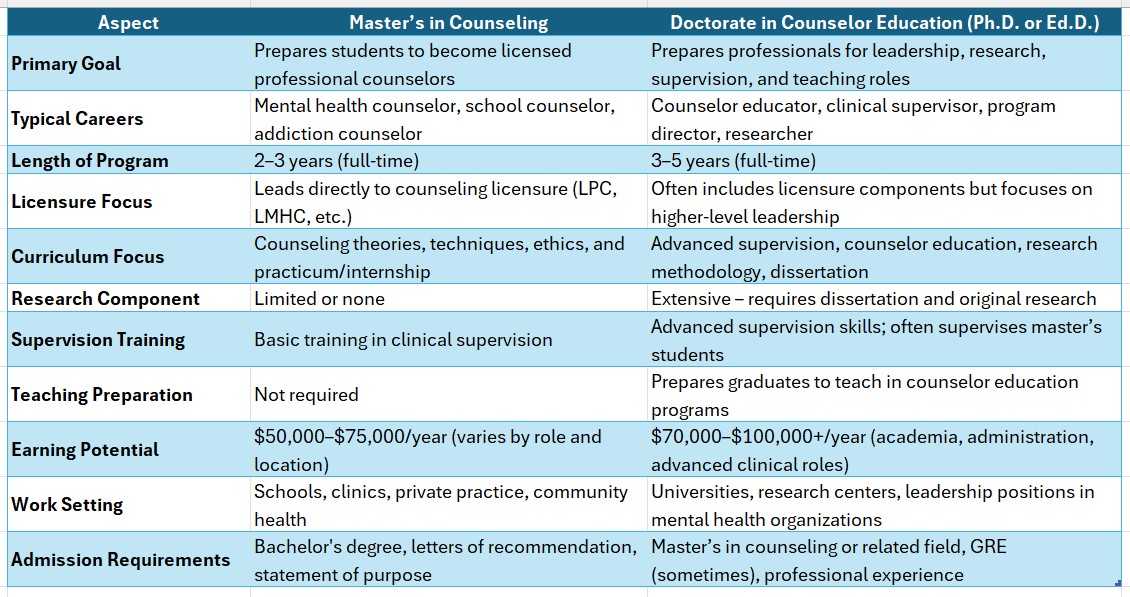
Understanding what a doctorate in counselor education is can open doors to exciting career opportunities. This advanced degree prepares individuals to become leaders in the field of counseling, equipping them with the skills needed to support students, families, and communities. But what exactly does this degree entail?
What Does a Doctorate in Counselor Education Involve?
A doctorate in counselor education focuses on training professionals to teach, supervise, and conduct research in counseling. Students learn about various counseling theories, ethics, and practices. This program often includes hands-on experiences, allowing students to apply their knowledge in real-world settings.
Key Benefits of Pursuing This Degree
- Career Advancement: A doctorate can lead to higher positions in educational institutions or private practice.
- Specialization: Students can focus on areas like mental health or school counseling.
- Research Opportunities: Engage in groundbreaking studies that can influence the field.
For those interested in related fields, a doctorate in special education or an online doctorate in educational psychology can also provide valuable insights and skills. Each of these programs offers unique perspectives that can enhance your counseling practice.
Study smarter, not harder—Enroll online today!
What Are the Key Components of a Doctorate in Counselor Education?
When considering a doctorate in counselor education, it’s essential to understand its key components. This advanced degree not only prepares you for a career in counseling but also equips you with the skills to educate future counselors. Let’s dive into what makes this program unique and valuable.
Core Curriculum
A doctorate in counselor education typically includes a mix of theoretical and practical courses. You’ll study topics like counseling theories, ethics, and research methods. Additionally, hands-on experiences through internships or practicums are crucial, helping you apply what you’ve learned in real-world settings.
Research Opportunities
Another vital aspect is the emphasis on research. As a doctoral student, you may explore areas like mental health trends or effective counseling strategies. This research component is similar to what you might find in a doctorate in special education or an online doctorate in educational psychology, where understanding and improving educational practices is key.
Faculty Support and Networking
Lastly, the support from faculty and networking opportunities are invaluable. Professors often have extensive experience in the field, guiding you through your studies and research. Plus, connecting with other professionals can open doors to job opportunities and collaborations in the future.
How Does a Doctorate in Counselor Education Differ from a Master’s Degree?

Understanding the difference between a doctorate in counselor education and a master’s degree is crucial for anyone considering a career in counseling. While both degrees prepare you for helping others, they do so at different levels and with varying depths of knowledge. Let’s explore how these two educational paths diverge.
Depth of Knowledge
A master’s degree in counseling typically focuses on foundational skills and techniques. In contrast, a doctorate in counselor education dives deeper into advanced theories, research methodologies, and leadership skills. This higher level of education prepares graduates for roles in academia, research, or high-level clinical practice.
Career Opportunities
With a master’s degree, you can become a licensed counselor, working directly with clients. However, a doctorate opens doors to:
- Teaching at universities
- Conducting research in the field
- Leading counseling programs This makes a doctorate in counselor education a great choice for those looking to influence the future of counseling.
Specializations
While a master’s degree may offer some specialization, a doctorate allows for even more focused study. For instance, you might explore areas like a doctorate in special education or an online doctorate in educational psychology. These options enable you to tailor your education to your specific interests and career goals.
What Career Opportunities Await Graduates of a Doctorate in Counselor Education?
A doctorate in counselor education opens up a world of opportunities for graduates. This advanced degree not only deepens your understanding of counseling theories and practices but also equips you with the skills needed to lead in educational settings. So, what career paths can you explore with this degree?
Career Opportunities with a Doctorate in Counselor Education
Graduates of a doctorate in counselor education can pursue various roles, including:
- University Professor: Teach future counselors and shape the next generation of professionals.
- Clinical Supervisor: Oversee counseling practices in clinics or schools, ensuring quality care.
- Program Director: Manage counseling programs in educational institutions or community organizations.
- Consultant: Provide expert advice on counseling practices and policies.
Additionally, those interested in specialized fields can consider a doctorate in special education or an online doctorate in educational psychology, broadening their expertise and career options.
Why Choose a Doctorate in Counselor Education?
Choosing this path means you’re committed to making a difference. With a doctorate in counselor education, you’ll not only enhance your career prospects but also gain the ability to impact lives positively. Whether you want to teach, lead, or innovate in counseling, this degree is a powerful tool for your future.
The Importance of Accreditation in Doctorate Programs for Counselor Education
When pursuing a doctorate in counselor education, understanding accreditation’s importance is essential. Accreditation ensures that your program meets high educational standards, which can significantly influence your career. A well-accredited program enhances your knowledge and boosts your credibility in the field.
Why Accreditation Matters
Accreditation acts as a stamp of approval. Here’s why it’s crucial:
- Quality Assurance: Accredited programs undergo regular evaluations to maintain educational quality.
- Career Opportunities: Employers prefer candidates from accredited programs, making job searches easier.
- Financial Aid: Many scholarships and financial aid options are exclusive to accredited programs.
Additionally, you might consider related fields like a doctorate in special education or an online doctorate in educational psychology, which also stress the importance of accreditation. This ensures you receive a quality education that prepares you for various roles in education and counseling.
The Benefits of an Accredited Program
Choosing an accredited doctorate in counselor education offers several advantages:
- Networking Opportunities: Accredited programs often have strong ties with industry professionals.
- Enhanced Learning: You’ll learn from experienced faculty who are experts in their fields.
Conclusion
In summary, pursuing an accredited doctorate in counselor education is vital for enriching your education and opening career doors. Whether you’re interested in counselor education, special education, or educational psychology, accreditation is key to your success.
Study smarter, not harder—Enroll online today!
What Skills Will You Gain from a Doctorate in Counselor Education?
A doctorate in counselor education is more than just a degree; it’s a journey into the heart of helping others. This advanced education equips you with vital skills to support individuals facing various challenges. Understanding what skills you will gain can help you decide if this path is right for you.
Key Skills Developed
- Advanced Counseling Techniques: You’ll learn sophisticated methods to guide clients through their issues effectively.
- Research Proficiency: This program emphasizes research skills, preparing you to contribute to the field with new insights.
- Leadership Abilities: You’ll develop the skills to lead counseling programs and mentor future counselors, making a significant impact.
- Cultural Competence: Understanding diverse backgrounds is crucial, and this degree helps you navigate various cultural contexts.
- Ethical Decision-Making: You’ll learn to handle complex ethical dilemmas, ensuring you provide the best care to your clients.
Pursuing a doctorate in special education or an online doctorate in educational psychology can also enhance your skill set. Each program offers unique insights, but they all share a common goal: to empower you to make a difference in people’s lives. With these skills, you’ll be well-equipped to tackle the challenges in the counseling field.
How Can ‘Scholarship.Education’ Support Your Journey in Pursuing a Doctorate in Counselor Education?
Pursuing a doctorate in counselor education is a significant step for those looking to deepen their expertise in mental health and counseling. This advanced degree not only enhances your knowledge but also opens doors to leadership roles in educational and clinical settings. Understanding what this degree entails can help you make informed decisions about your future.
At ‘Scholarship.Education’, we understand that navigating the path to a doctorate in counselor education can be overwhelming. Here’s how we can help:
- Comprehensive Resources: Access articles and guides that explain the nuances of a doctorate in special education and related fields.
- Expert Advice: Connect with professionals who have successfully completed their online doctorate in educational psychology. They can share valuable insights and tips.
- Community Support: Join forums and discussion groups where you can ask questions and share experiences with fellow students and educators.
- Flexible Learning Options: Explore various online programs that fit your schedule, making it easier to balance work and study.
- Career Guidance: Receive personalized advice on career paths available after earning your doctorate in counselor education.
- Networking Opportunities: Attend webinars and events to connect with industry leaders and fellow students, expanding your professional network.
Is a Doctorate in Counselor Education Worth the Investment?
When considering higher education, many wonder about the value of a doctorate in counselor education. This advanced degree enhances your understanding of counseling theories and opens doors to leadership roles. So, is it worth the investment? Let’s explore!
Benefits of a Doctorate in Counselor Education
- Career Advancement: Pursue higher positions in schools, universities, or private practice.
- Specialization: Focus on areas like mental health or school counseling to enhance your expertise.
- Research Opportunities: Engage in research that can influence counseling practices and policies.
Alternatives to Consider
You might also explore a doctorate in special education or an online doctorate in educational psychology. Each offers unique benefits and can complement your counseling skills, making you a more versatile professional. Ultimately, your choice should align with your career goals.
Financial Considerations
Investing in a doctorate can be significant, but many graduates find that the increased earning potential justifies the cost. It’s essential to weigh this financial commitment against your career aspirations.
Time Commitment
Pursuing a doctorate typically requires several years of study, which can be daunting but often leads to greater job satisfaction and professional growth. Consider how this aligns with your personal goals.
Job Market Demand
The demand for qualified counselors is growing. A doctorate in counselor education positions you favorably in a competitive job market, as schools and organizations seek leaders with advanced training.
Study smarter, not harder—Enroll online today!
FAQs
1. What is a Doctorate in Counselor Education?
It’s a terminal degree (typically a PhD or EdD) that prepares individuals for leadership roles in counseling, such as teaching, supervision, research, or advanced clinical practice.
2. Who should pursue this degree?
Licensed or experienced counselors who want to move into academia, research, or high-level administrative or supervisory roles in mental health or educational settings.
3. What are the admission requirements?
Most programs require a master’s degree in counseling or a related field, licensure or eligibility for licensure, professional experience, letters of recommendation, and a statement of purpose.
4. How long does the program take to complete?
Generally, 3 to 5 years, depending on full-time or part-time enrollment and dissertation progress.
5. Is CACREP accreditation important?
Yes, CACREP-accredited programs are preferred for licensure, academic, and supervisory positions. Many employers and states prioritize or require it.
6. What can I do with this degree?
Graduates often become counselor educators, researchers, clinical supervisors, program directors, or advanced practitioners.





